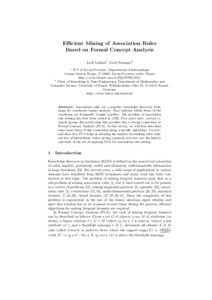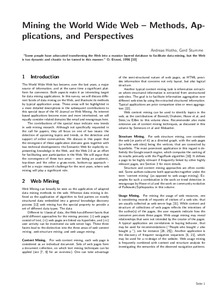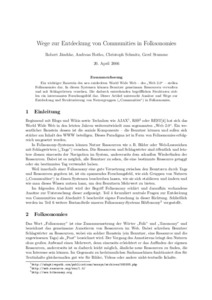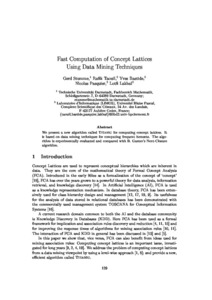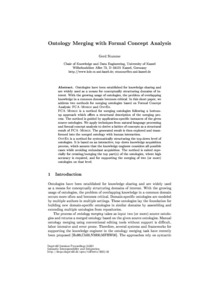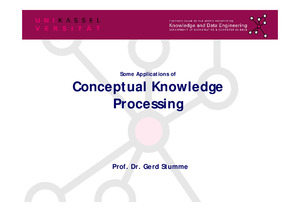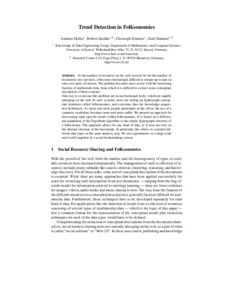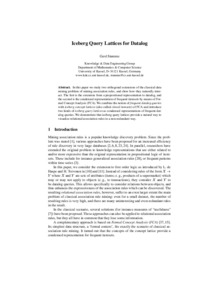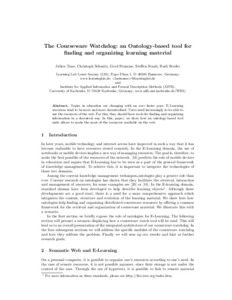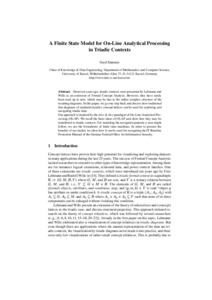Suche
Anzeige der Dokumente 1-10 von 34
Preprint
 Efficient mining of association rules based on formal concept analysis
Efficient mining of association rules based on formal concept analysis
(2005)
Association rules are a popular knowledge discovery technique for warehouse basket analysis. They indicate which items of the warehouse are frequently bought together. The problem of association rule mining has first been stated in 1993. Five years later, several research groups discovered that this problem has a strong connection to Formal Concept Analysis (FCA). In this survey, we will first introduce some basic ideas of this connection along a specific algorithm, TITANIC, and show how FCA helps in reducing the ...
Preprint
 Wege zur Entdeckung von Communities in Folksonomies
Wege zur Entdeckung von Communities in Folksonomies
(2006)
Ein wichtiger Baustein des neu entdeckten World Wide Web - des "Web 2.0" - stellen Folksonomies dar. In diesen Systemen können Benutzer gemeinsam Ressourcen verwalten und mit Schlagwörtern versehen. Die dadurch entstehenden begrifflichen Strukturen stellen ein interessantes Forschungsfeld dar. Dieser Artikel untersucht Ansätze und Wege zur Entdeckung und Strukturierung von Nutzergruppen ("Communities") in Folksonomies.
Aufsatz
 Fast computation of concept lattices using data mining techniques
Fast computation of concept lattices using data mining techniques
(2000)
We present a new algorithm called TITANIC for computing concept lattices. It is based on data mining techniques for computing frequent itemsets. The algorithm is experimentally evaluated and compared with B. Ganter's Next-Closure algorithm.
Preprint
 Ontology merging with formal concept analysis
Ontology merging with formal concept analysis
(2005)
Ontologies have been established for knowledge sharing and are widely used as a means for conceptually structuring domains of interest. With the growing usage of ontologies, the problem of overlapping knowledge in a common domain becomes critical. In this short paper, we address two methods for merging ontologies based on Formal Concept Analysis: FCA-Merge and ONTEX. --- FCA-Merge is a method for merging ontologies following a bottom-up approach which offers a structural description of the merging process. The method ...
Preprint
 Trend detection in folksonomies
Trend detection in folksonomies
(2006)
As the number of resources on the web exceeds by far the number of documents one can track, it becomes increasingly difficult to remain up to date on ones own areas of interest. The problem becomes more severe with the increasing fraction of multimedia data, from which it is difficult to extract some conceptual description of their contents. One way to overcome this problem are social bookmark tools, which are rapidly emerging on the web. In such systems, users are setting up lightweight conceptual structures called ...
Preprint
 Iceberg query lattices for datalog
Iceberg query lattices for datalog
(2004)
In this paper we study two orthogonal extensions of the classical data
mining problem of mining association rules, and show how they naturally interact. The first is the extension from a propositional representation to datalog, and the second is the condensed representation of frequent itemsets by means of Formal Concept Analysis (FCA). We combine the notion of frequent datalog queries with iceberg concept lattices (also called closed itemsets) of FCA and introduce two kinds of iceberg query lattices as condensed ...
Preprint
 The Courseware Watchdog: an ontology-based tool for finding and organizing learning material
The Courseware Watchdog: an ontology-based tool for finding and organizing learning material
(2003)
Topics in education are changing with an ever faster pace. E-Learning resources tend to be more and more decentralised. Users need increasingly to be able to use the resources of the web. For this, they should have tools for finding and organizing information in a decentral way. In this, paper, we show how an ontology-based tool suite allows to make the most of the resources available on the web.
Preprint
 A finite state model for on-line analytical processing in triadic contexts
A finite state model for on-line analytical processing in triadic contexts
(2005)
About ten years ago, triadic contexts were presented by Lehmann and Wille as an extension of Formal Concept Analysis. However, they have rarely been used up to now, which may be due to the rather complex structure of the resulting diagrams. In this paper, we go one step back and discuss how traditional line diagrams of standard (dyadic) concept lattices can be used for exploring and navigating triadic data. Our approach is inspired by the slice & dice paradigm of On-Line-Analytical Processing (OLAP). We recall the ...

